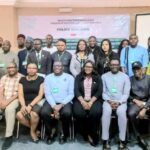Tax Reform Bills: Customs duties beyond revenue collection– expert
By Martha Agas A customs and tax expert, Mr Okey Ibeke, says the duties of the Nigeria Customs Service (NCS) is not only limited to revenue collection but involves highly technical operations. Ibeke stated this on Thursday in Abuja, following a public hearing on tax reform bills organised by theContinue Reading




















